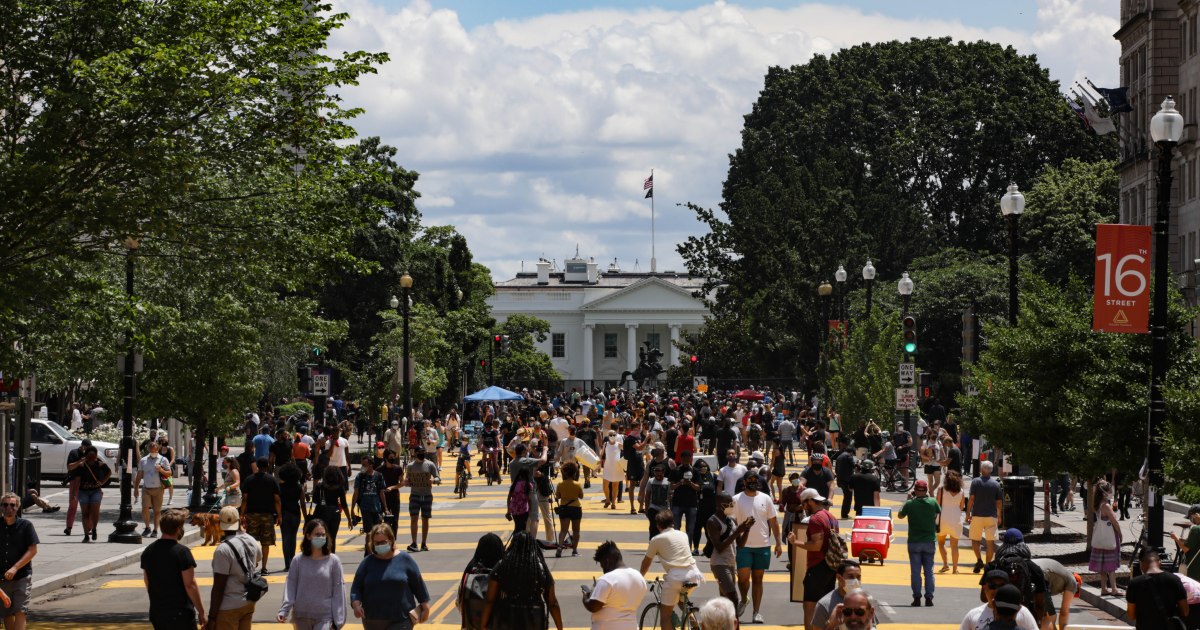Washington, DC, and American cities witnessed several protests against the killing of George Floyd and a condemnation of police violence, while President Trump ordered the withdrawal of the National Guard from Washington, DC, considering that the situation is under control, while Republicans are increasingly pessimistic about the path the country is taking today.
Loud public protests continued in the streets of Washington and in front of the White House at the invitation of civil and political organizations.
In New York, protesters gathered in Washington Square, south of Manhattan, as part of marches and protest movements in the city to demand an end to what protesters describe as racial discrimination, and an end to what they say is unjustified violence by the police.
Bill in response to Floyd’s death
In the context of non-mass reactions to Floyd’s killing, Democrats led by African-American lawmakers in the US Congress are proposing legislation to combat police violence and the absence of interracial justice, including facilitating the prosecution of officers who commit homicides.
A conglomerate of African-American lawmakers in Congress with more than 50 members of the House of Representatives and the Senate will unveil the legislation expected on Monday to include preventing the police from using strangling positions and classifying suspects according to race, and that it requires installing cameras for police officers, and subjecting their devices to civilian oversight councils, Imposing new protocols for its work limits the use of deadly force, and obligates its members to intervene if they witness a breach of labor rules.
The legislation, which is also expected to establish a national database that identifies police breaches of the rules, has the support of top Democratic politicians, including House Speaker Nancy Pelosi and Senate Democratic leader Chuck Schumer.
Soldiers deployed in Washington
In a related development, President Donald Trump on Sunday ordered the withdrawal of the National Guard from Washington, DC, saying that the situation was under control after the past few days witnessed protests related to the death of George Floyd.
"I just ordered our National Guard to begin withdrawing from (Washington DC) after everything came under control," he wrote on Twitter.
Trump added that they would withdraw, "but they can return quickly if necessary ... the demonstrators are far fewer than expected yesterday (Saturday) evening."
A senior US official disclosed that President Trump told his advisers last week that he wanted to deploy 10,000 Army troops in the Washington DC area to stop civil unrest in protest at the killing of a black citizen by police in Minneapolis.
This account of Trump's demand during a heated debate in the Oval Office shows how close the president is to implementing his threat to deploy regular army forces despite opposition from Defense Ministry leaders.
The official said that Defense Secretary Mark Esber, Chairman of the Joint Chiefs of Staff General Mark Millie and Justice Minister William Barr recommended at that meeting not to deploy the forces.
He added that the meeting witnessed differences of opinion. The White House did not immediately reply to a request for comment.
Since then, Trump has expressed satisfaction with the deployment of the National Guard, the option recommended by the Ministry of Defense. The National Guard is the traditional tool for dealing with internal crises.
On Wednesday, Esber publicly expressed his opposition to the deployment of the working army, in comments to reporters that were not well received by Trump and his top aides. The U.S. official said that Trump shouted to Esper after that press conference.
While there has been speculation about whether the president will isolate Esber, White House spokeswoman Kelly McKinani said Trump "still trusts the minister."
Republicans pessimism
In the context of the repercussions of the current crises on Trump's popularity, Republicans have become more pessimistic about the path the United States is taking than at any time since President Donald Trump took office, at a time when he defied three presidencies: the Corona virus, the economic downturn, and the mass protests against Police brutality.
A Reuters / Ipsos poll last week showed that only 46% of Americans who see themselves as Republicans say the country is on the right track.
It is the first time that this number has fallen to such a degree since August 2017, when a rally organized by extremists who believe in white sex superiority in Charlottesville, Virginia, led to violent clashes with protesters opposed to them.
Until early March last, before the Corona virus caused widespread isolation decisions across the country, about 70 percent of Republicans said they were optimistic about the country's course.
Trump's popularity remains at 40%, with a large majority of Republicans still generally favoring his performance.
37% of Republicans said that the country is on the wrong path, 17% of them said they would vote for Biden if elections were held now, while 63% of all Republicans still intend to vote for Trump.
However, experts say the prolonged pessimism among Trump supporters may herald a potential weakness ahead of next November's election in which his opponent will face Joe Biden, the former Democratic vice president.

